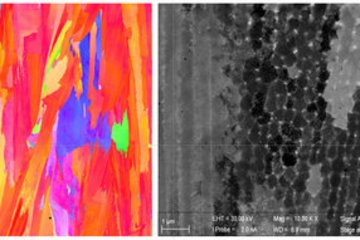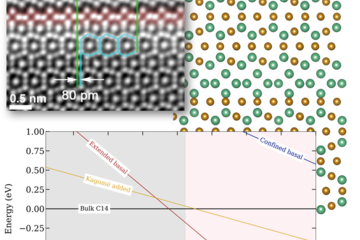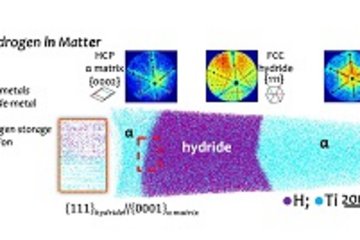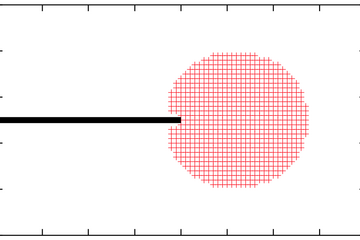All genres
1781.
Talk
Arthropod Cuticle: A Biological Multifunctional Composite Used As Template for Multidisciplinary Nano-To-Macro-Scale Hierarchical Modeling. 139th Annual Meeting of the Minerals, Metals and Materials Society (TMS), Seattle, WA, USA (2010)
1782.
Talk
Kinetic Monte Carlo simulations and ab initio studies of nano-precipitation in ferritic steels. Computational Materials Science on Complex Energy Landscapes Workshop, Imst, Austria (2010)
1783.
Talk
Orientation patterning in copper single crystals: Experimental observation and laminate analysis in dislocation dynamics. 9th GAMM Seminar on Microstructures 2010, University of Stuttgart, Germany (2010)
1784.
Talk
A non-local crystal plasticity model based on polar dislocation densities. 16th Int. Symp. on Plasticity and Its Current Applications, St. Kitts, St. Federation of Saint Kitts and Nevis (2010)
1785.
Talk
Characterization of CuInSe2 and Cu(In,Ga)Se2 thin-film solar cells using Atom Probe Tomography. Zentrum für Sonnenenergie und Wasserstoffforschung (ZSW), Stuttgart, Germany (2010)
1786.
Talk
Chemical Imaging of Heterogeneous Materials: Allocation of Organic and Inorganic Components in Biomaterials. 1. Raman-Workshop Linz, Linz, Austria (2010)
1787.
Talk
Crustacean skeletal elements: Variations in the constructional morphology at different hierarchical levels. DFG Winter School Priotity Programme 1420: "Biomimetic Materials Research: Functionality by Hierarchical Structuring of Materials", Kerkrade, The Netherlands (2010)
1788.
Talk
Extremal stiffness of crustacean cuticle through hierarchical optimization: Theory, modeling, and experiment. 3rd International Conference on Mechanics of Biomaterials & Tissues, multiscale modeling of tissue mechanical properties, Clearwater Beach, FL, USA (2009)
1789.
Talk
Ab initio Determined Fundamental Materials-design Limits in Mg–Li–X (X = Al, Si, Zn, Ca, Cu) Ternaries. Materials Research Society (MRS) meeting, Boston, MA, USA (2009)
1790.
Talk
Theory-guided Design of Bone-matched Ti-based Multi-phase Biomaterials. Materials Research Society (MRS) meeting, Boston, MA, USA (2009)
1791.
Talk
Coarse-graining of polycrystal plasticity with the Relaxed Grain Cluster scheme. Seminar des Instituts für Technische Mechanik, Karlsruher Institut für Technologie, Karlsruhe, Germany (2009)
1792.
Talk
First-principles based multi-scale approaches to the elasticity of metallic polycrystals and hierarchical bio-composites. AICES meets MPIE workshop, Monschau, Germany (2009)
1793.
Talk
Ab Initio Determined Materials-Design Limits in Ultra Light-Weight Mg-Li Alloys. 8th International Conference on Magnesium Alloys and their Applications, Weimar, Germany (2009)
1794.
Talk
Concepts for integrating non-local crystal plasticity models with damage nucleation at grain boundaries. Materials Science & Technology 2009 Conference, Pittsburgh, PA, USA (2009)
1795.
Talk
Ultra high strength steel design by using nanoparticles. Proceedings 2nd Inter. Symp. Steel Science ISSS 2009, Kyoto, Japan (2009)
1796.
Talk
Development of a high ductile lean duplex stainless steel. 2nd International Conference on Super-High Strength Steels SHSS, Peschiera del Garda, Italy (2009)
1797.
Talk
Crystal plasticity analysis of nanoindentation in intermetallic gamma-TiAl. Nanomechanical Testing in Materials Research and Development, Barga, Italy (2009)
1798.
Talk
Microstructure and properties of interfaces formed by explosion cladding of Ti-Steel. XXI Conference on Applied Crystallography, Zakopane, Poland (2009)
1799.
Talk
Electron microscopy studies of bonding interface in explosively welded Ti/low carbon steel clads. XXI Conference on Applied Crystallography, Zakopane, Poland (2009)
1800.
Talk
Multi-physical alloy approaches to solid solution strengthening of Al. 1st International Conference on Material Modelling, Dortmund, Germany (2009)









